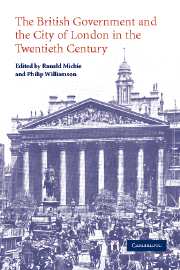Book contents
- Frontmatter
- Contents
- Notes on contributors
- Acknowledgements
- Conventions and abbreviations
- Introduction
- Part I The long perspective
- Part II Markets and society
- Part III Government and political parties
- 6 The Treasury and the City
- 7 The Liberals and the City 1900–1931
- 8 The Conservatives and the City
- 9 Labour party and the City 1945–1970
- Part IV The interwar period
- Part V 1945–2000
- Select bibliography
- Index
8 - The Conservatives and the City
Published online by Cambridge University Press: 04 July 2009
- Frontmatter
- Contents
- Notes on contributors
- Acknowledgements
- Conventions and abbreviations
- Introduction
- Part I The long perspective
- Part II Markets and society
- Part III Government and political parties
- 6 The Treasury and the City
- 7 The Liberals and the City 1900–1931
- 8 The Conservatives and the City
- 9 Labour party and the City 1945–1970
- Part IV The interwar period
- Part V 1945–2000
- Select bibliography
- Index
Summary
In terms of British political history the twentieth century has been justifiably termed ‘the Conservative Century’; it would be equally justifiable to describe British economic history in the twentieth century as ‘the City's Century’. Of course the term that has been most closely associated with the economic history of twentieth-century Britain is decline, reflected in the titles of many of the most celebrated and widely used studies of British economic development in the past hundred years. But the service sector, and in particular banking and financial services, have until recently stood out as apparently immune to the ‘British disease’. That the service sector, particularly the City, flourished has raised the question of whether this was due simply to market strengths or to the City's interests being actively fostered by government economic strategy and policy over the long term. Inasmuch as governments throughout the century were overwhelmingly Conservative this in turn raises the question of whether the politics of the Conservative century and the economics of the century of the City were related. At first glance the City and the Conservative party do appear to have enjoyed close relations. In the last quarter of the nineteenth century the Conservatives had replaced the Liberals as the pre-eminent political representatives of City opinion, and in the last two decades of the twentieth century ‘Big Bang’ players on London's international dealing, commodity and capital markets were very much associated with Thatcher's Conservative party.
- Type
- Chapter
- Information
- Publisher: Cambridge University PressPrint publication year: 2004
- 2
- Cited by



